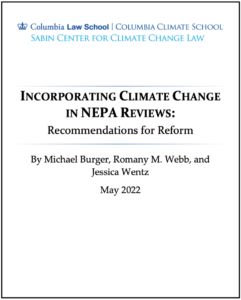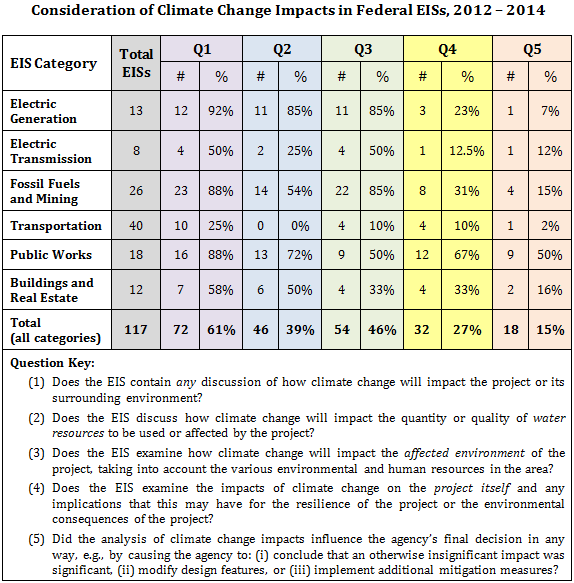 On April 20, 2022, the White House Council on Environmental Quality (CEQ) finalized revisions to the regulations implementing the National Environmental Policy Act (NEPA). The revisions undo changes made to the regulations during the Trump administration, which critics alleged could prevent federal agencies’ considering climate change in NEPA reviews. In announcing the revisions, CEQ indicated that it was making limited changes now to ensure federal agencies undertake “the proper scope of analysis that NEPA requires,” and that it would consider “more comprehensive” regulatory changes in the future. In particular, CEQ is exploring changes to ensure “efficient and effective environmental reviews that are guided by science” and promote improved federal decision-making to advance “climate change mitigation and resilience goals.” In a new white paper, published online today, the Sabin Center recommends seven key reforms that would further those objectives.
On April 20, 2022, the White House Council on Environmental Quality (CEQ) finalized revisions to the regulations implementing the National Environmental Policy Act (NEPA). The revisions undo changes made to the regulations during the Trump administration, which critics alleged could prevent federal agencies’ considering climate change in NEPA reviews. In announcing the revisions, CEQ indicated that it was making limited changes now to ensure federal agencies undertake “the proper scope of analysis that NEPA requires,” and that it would consider “more comprehensive” regulatory changes in the future. In particular, CEQ is exploring changes to ensure “efficient and effective environmental reviews that are guided by science” and promote improved federal decision-making to advance “climate change mitigation and resilience goals.” In a new white paper, published online today, the Sabin Center recommends seven key reforms that would further those objectives.
As explained in the paper, the proposed reforms are consistent with prior CEQ guidance and court decisions. In guidance issued in 2016, CEQ identified climate change as a “fundamental environmental issue” and concluded that “its effects fall squarely within NEPA’s purview.” The guidance identified two key climate change considerations requiring analysis under NEPA: (1) the “potential effects of a proposed action on climate change’ (i.e., via greenhouse gas (GHG) emissions); and (2) the “effects of climate change on a proposed action and its environmental impacts.” The courts have repeatedly confirmed that federal agencies are required to consider both factors in their NEPA reviews. Despite this, however, many agencies have been slow to integrate climate change considerations into their NEPA reviews.
Previous Sabin Center surveys of federal environmental impact statements (EISs) issued under NEPA have found major gaps and shortcomings in agencies’ climate change analyses. Most recently, a survey of all federal EISs issued in connection with onshore energy projects from 2016 through 2020 found that less than half of the EISs considered whether and how climate change would alter the environmental outcomes of the proposed action, and less than ten percent compared climate change impacts across alternatives. (Previous Sabin Center surveys have also identified similar deficiencies in agency analyses. See here and here for examples.)
The survey findings suggest that changes to the NEPA implementing regulations are needed to ensure federal agencies appropriate integrate climate change considerations into their NEPA reviews. We recommend changes to:
- ensure federal agencies consider global context when assessing the significance of a proposed action’s GHG emissions;
- establish a quantitative significance threshold for GHG emissions;
- provide additional guidance to federal agencies on accounting for climate change in environmental assessments;
- clarify how federal agencies can use of programmatic reviews and tiering to streamline NEPA implementation;
- require federal agencies to consider changing conditions and foreseeable trends when evaluating environmental impacts and mitigation measures;
- require federal agencies to use the “best available science” in NEPA reviews; and
- ensure balanced consideration of all costs and benefits in NEPA reviews.
Read full the paper here.
This is test biographical description.



